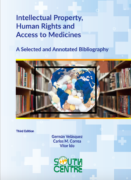Asia
An Examination of Selected Public Health Exceptions in Asian Patent Laws
By Kiyoshi Adachi
This study examines the variations within Asia of two exceptions to patent rights that are commonly justified under Article 30 of the World Trade Organization (WTO) Agreement on Trade-related Aspects of Intellectual Property Rights (the TRIPS Agreement), namely the research and experimentation exception and the regulatory review (or “Bolar”) exception. Both these exceptions are important in the context of the 2001 Doha Declaration on the TRIPS Agreement and Public Health insofar as they are designed to provide flexibility to protect public health and support countries’ overall scientific and technological aspirations. The study examines, from a comparative perspective, examples of these respective exceptions in patent legislation in South, Southeast and East Asia, and identifies peculiarities in the variations among countries in these sub-regions.
(more…)
Could COVID-19 trigger ‘localizing’ of international investment arbitration?
By Danish
In light of the challenges and travel restrictions due to the COVID-19 pandemic, many developing countries have been unable to effectively participate in international investment arbitration proceedings, traditionally held in locations like Washington D.C. and The Hague. To ease the heavy burdens currently being placed on States and ensuring investor confidence, this Policy Brief argues for the ‘localization’ of investor-State dispute settlement (ISDS) proceedings in host States and regions where the investment is actually located. It highlights the various advantages that localizing ISDS can bring, and the different regional initiatives already working towards this purpose. The brief also considers relevant legal and policy aspects, and seeks to provide concrete suggestions for the localization of ISDS as a small step towards the holistic reform of international investment arbitration.
(more…)
Webinar on Tax Policy Options For Funding the Post-COVID Recovery in the Global South
The COVID-19 pandemic has negatively affected tax revenue collection globally, with the Global South especially hard-hit. The decline in economic activity has meant reduced corporate profits, declining consumption and increasing unemployment. This in turn implies declining revenue from corporate income taxes, goods and services taxes and personal income taxes. Resource-rich countries are especially being affected by the drop in global commodity prices and decline in international trade. This reduction in revenue collection is limiting developing countries’ ability to effectively respond to the COVID-19 crisis. It is therefore necessary to explore what are the concrete tax policy measures developing countries can take to raise revenue at this critical time. Measures pertaining to the digitalized economy are of particular importance given the increasing sales of tech companies and highly digitalized businesses during the lockdown.
(more…)
Spotlight: Asia-Pacific and the Implementation of the Beijing Platform for Action
Regional Round-up on progress in implementing the Beijing Platform for Action in light of the upcoming 25th anniversary of the platform. Spotlight: Asia-Pacific
(more…)
Intellectual Property, Human Rights and Access To Medicines: A Selected and Annotated Bibliography (3rd Edition)
 About the Book:
About the Book:
The South Centre seeks to provide appropriate technical assistance and country support to developing countries, within comprehensive and coherent national IP strategies to promote implementation of the TRIPS Agreement that is consistent with the protection of public health and the promotion of access to medicines. This selected and annotated bibliography has been prepared to assist developing countries to implement IP policies and regulations consistent with development goals and public health principles. The growing volume of literature on the issue of IP, R&D, human rights and access to medicines can help developing countries to find the opportunities and room for manoeuvre to protect their citizens from the unhealthy environment created by international trade rules. This bibliography is not an exhaustive list but it highlights some of the most pertinent works from the South views and perspectives. The selected references are a valuable instrument for those interested in promoting universal access to medical innovation.
Authors: Germán Velásquez, Carlos M. Correa and Vitor Ido
(more…)
Inequality is one of the greatest challenges that the world needs to face. Inequality is intimately linked with poverty. Although there has been progress in reducing poverty, a large part of the global population (overwhelmingly living in developing countries) is still denied access to a dignified life. While no poverty and reduced inequality are two of the outstanding Sustainable Development Goals, these and other goals are unlikely to be achieved by 2030. In fact, inequality is on the rise. Changing this situation will certainly require significant efforts at the national and regional level. But it also requires an international architecture that supports those efforts by respecting the policy space that countries need and coordinating constructive actions within the multilateral system. The current initiatives to ‘reform’ this system will only be legitimate if they recognize the gaps in the levels of development and contribute to effectively address them under a fair, pro-development system of rules. Please see last month’s SouthViews on “Understanding global inequality in the 21st century” by Jayati Ghosh, development economist and Professor of Economics at Jawaharlal Nehru University.
(more…)
On World AIDS Day, threat to access to medicines looms large
By Shailly Gupta
Today millions of people living with HIV in South-East Asia are receiving treatment and leading healthy lives thanks to affordable generic antiretroviral (ARVs) medicines. Governments and treatment providers across Asia, such as the government of Indonesia and Médecins Sans Frontières (MSF), patients across our missions in many countries, depend on an uninterrupted supply of affordable generic HIV medicines to reduce new HIV infections and AIDS-related deaths in the region. But as the trade negotiators from 16 countries gather in Indonesia next week to deliberate the terms of a trade agreement — the Regional Comprehensive Economic Partnership agreement (RCEP), access to low-cost generic medicines is under grave threat. (more…)













 About the Book:
About the Book: